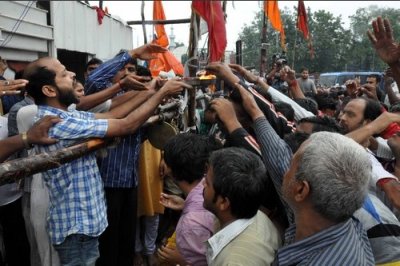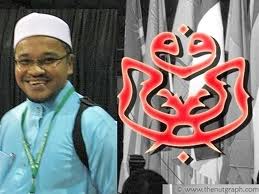Incomplete Diwali decoration at Bhagyalakshmi Mata Temple at Charminar due to Islamic objections.
Upananda Brahmachari from Bhagya Nagar (Hyderabad) || 10-11-12 (10th Nov. 2012) :: This Diwali is not so delightful for the Hindus in Hyderabad. Islamic maroon in MIM ( Majlis-e-Ittehad-ul Muslimeen) have taken the vow to hamper the Diwali Celebration at Historical Bhagyalakshmi Temple at Charminar in the city at any cost. So they are not ready to allow any makeshift pandal decoration for the yearly Diwali Celebration at Bhagyalakshmi Mata Temple, in the same style of the Kashmiri agitators, how they were not allowing the use 99 acres of land for Amarnath Pilgrimage in 2008. Then the Kashmiri subversive elements saw a bogey of demographic change of J&K due to Amarnath pilgrimage and for the temporary transfer of that lands to Amarnath Shrine Board. Now, the Hyderabadi maroons just feel the disturbance and embarrassment for Allah due to the temple bells of Bahyalakshi Mata Mandir and illuminations of Diwali. Actually those creatures are the dwellers of darkness and can’t bear any ray of light.
 Tensions prevail again in old city Sunday following rumours that the management of Bhagyalakshmi Temple had taken up its expansion work near the Charminar. Actually, the Temple committee is only trying to set a temporary shed adjacent to it for accommodating the devotees to attend the yearly Diwali Celebration in the Temple as a long drawn traditions. Due to the status quo order passed by the Hon’ble Andhra Pradesh High Court on 5th November, the MIM idiots spread various types of rumours so that the Diwali decoration in the Baghyalakshmi Mata Temple cannot be done properly, as reports came in.
Tensions prevail again in old city Sunday following rumours that the management of Bhagyalakshmi Temple had taken up its expansion work near the Charminar. Actually, the Temple committee is only trying to set a temporary shed adjacent to it for accommodating the devotees to attend the yearly Diwali Celebration in the Temple as a long drawn traditions. Due to the status quo order passed by the Hon’ble Andhra Pradesh High Court on 5th November, the MIM idiots spread various types of rumours so that the Diwali decoration in the Baghyalakshmi Mata Temple cannot be done properly, as reports came in.
 ‘As tension mounted in some parts of old city over the rumours, the area was cordoned off and some leaders of MIM party were prevented from trying to proceed towards Charminar, violating prohibitory orders banning assembly of five or more persons, police said.
‘As tension mounted in some parts of old city over the rumours, the area was cordoned off and some leaders of MIM party were prevented from trying to proceed towards Charminar, violating prohibitory orders banning assembly of five or more persons, police said.
“Six MIM legislators and its two councillors were taken into custody as a precautionary measure for not allowing police to maintain status quo orders of the Andhra Pradesh High Court, a senior police officer said.
The MIM leaders alleged that despite the state High Court ordering status quo, some groups were carrying out the expansion work.
However, Bhagyalaxmi Devalaya Parirakshana Samithi convener Bhagavanth Rao refuted the charges saying that they have been maintaining court’s orders and merely took up works to decorate temple on the occasion of Diwali.
Meanwhile, city Police Commissioner Anurag Sharma appealed to people to maintain peace and not to believe the rumours.
The usually busy roads leading to the 400-year-old Charminar monument were deserted with police sealing off all the routes by erecting barricades and barbed fencing.
Police intensified patrolling in the sensitive areas of the old city that witnessed communal clashes last week.
Prohibitory orders banning assembly of five or more people remained in force in areas falling under five police station limits of South Zone in old city from November 8.
A large number of policemen including the Rapid Action Force (RAF) were deployed in communally sensitive areas.
 BJP on Saturday took out a rally in protest against the state government for not allowing to undertake decoration work at century old temple adjacent to Charminar, on the occasion of Diwali festival.
BJP on Saturday took out a rally in protest against the state government for not allowing to undertake decoration work at century old temple adjacent to Charminar, on the occasion of Diwali festival.
On a petition filed by MIM, the state High Court recently gave a direction to maintain status quo as on October 30.’ ['-' from Hindu].
For the hardness from both the communities, the normal life of the peace loving people are grossly hampered.
The prominent Hindu leader of Sri Ram Yuba Sena and Telgu Desham councillor, Thakur Raja Singh alleged the softness of the ruling party towards MIM perpetrators. In his facebook page Raja Singh remarked: “T. Raja Singh ko Bhagyalaxmi Mata Mandir jaane se pehle he roka gaya aur ACP dwara arrest kiya gaya. DCP ko Raja Bhai ne kal tak ka time diya hai. Agar mandir ka kaam shuru nahi hua toh iske anjaam k liye taiyaar rahe. Aao Hindu bhaiyo kal ek naya itihaas likhe. Jai Sri Ram”
However, the decoration of Diwali is still pending at Bhagyalakshmi Mata Temple, even in the day of ‘Dhanteras’ – the eve of Diwali. From Amarnath to Hyderabad, Kolkata to Dwaraka, Muslims of India are repeatedly challenging the festivals of Hindus. Numbers of Hindu Pujas and Festivals are decreasing due to the Islamic resistance. But, while Hindus will start a real resistance to save their Dharma, these anti-Hindus will find no place in Hindustan.

Updates from Hyderabad: 12-11-2012 : 1. Police Commissioner Anurag Shrama said that he followed “COURT ORDERS” which were implemented after reports from ASI and other AUTHORITIES who were served the COURT ORDERS by the HIGH COURT.
According to police. In Yesterday violence 4 (four) RTC buses were pelted with stones, 2 (two) private vehicles were damaged and one ATM was damaged, police booked cases related to incidents of violence. Apparently “City is peaceful.”.
2. Heavy restrictions and deployment are seen around Charminar and Sri Mata Bhagyalakshmi Temple. Temple priest preparing for Special Puja of Deepwali in the Temple without any special festive decoration of the Temple.
3. Pujyasri Paripoornananda Saraswati Swamiji was arrested and was taken to Gandi Nagar Police Station when Swamiji was Going towards Bhagya Lakshmi Temple In Hyderabad to visit.
4. MIM (All India Majlis-e-Ittehad-ul Muslimeen) withdrawn support from Congress Govt. of Andhra Pradesh. And perhaps MIM perpetrators are planning a ‘direct action’ against Hindus of Hyderabad.
5. Hindus of Hyderabad are ready to face any challenge of Anti National Force ith the Blessings of Ma Bhavani and under the Leadership of Thakur Raja Singh and other Hindu prominents.

Protest
Maharati by Bajrang Dal & Sri Ram Sena Activist for the demand of
Diwali Decoration at Bhagyalakshmi Temple at Charminar, Hyderabad.

Hindu Retaliation in Bhagyanagar (Hyderabad) is taking a new dimension.
“Six MIM legislators and its two councillors were taken into custody as a precautionary measure for not allowing police to maintain status quo orders of the Andhra Pradesh High Court, a senior police officer said.
The MIM leaders alleged that despite the state High Court ordering status quo, some groups were carrying out the expansion work.
However, Bhagyalaxmi Devalaya Parirakshana Samithi convener Bhagavanth Rao refuted the charges saying that they have been maintaining court’s orders and merely took up works to decorate temple on the occasion of Diwali.
Meanwhile, city Police Commissioner Anurag Sharma appealed to people to maintain peace and not to believe the rumours.
The usually busy roads leading to the 400-year-old Charminar monument were deserted with police sealing off all the routes by erecting barricades and barbed fencing.
Police intensified patrolling in the sensitive areas of the old city that witnessed communal clashes last week.
Prohibitory orders banning assembly of five or more people remained in force in areas falling under five police station limits of South Zone in old city from November 8.
A large number of policemen including the Rapid Action Force (RAF) were deployed in communally sensitive areas.

BJP’s Protest for Diwali Cause at Bhagyalakshmi temple at Charminar, Hyderabad.
On a petition filed by MIM, the state High Court recently gave a direction to maintain status quo as on October 30.’ ['-' from Hindu].
For the hardness from both the communities, the normal life of the peace loving people are grossly hampered.
The prominent Hindu leader of Sri Ram Yuba Sena and Telgu Desham councillor, Thakur Raja Singh alleged the softness of the ruling party towards MIM perpetrators. In his facebook page Raja Singh remarked: “T. Raja Singh ko Bhagyalaxmi Mata Mandir jaane se pehle he roka gaya aur ACP dwara arrest kiya gaya. DCP ko Raja Bhai ne kal tak ka time diya hai. Agar mandir ka kaam shuru nahi hua toh iske anjaam k liye taiyaar rahe. Aao Hindu bhaiyo kal ek naya itihaas likhe. Jai Sri Ram”
However, the decoration of Diwali is still pending at Bhagyalakshmi Mata Temple, even in the day of ‘Dhanteras’ – the eve of Diwali. From Amarnath to Hyderabad, Kolkata to Dwaraka, Muslims of India are repeatedly challenging the festivals of Hindus. Numbers of Hindu Pujas and Festivals are decreasing due to the Islamic resistance. But, while Hindus will start a real resistance to save their Dharma, these anti-Hindus will find no place in Hindustan.

Justice for Hindus?
Updates from Hyderabad: 12-11-2012 : 1. Police Commissioner Anurag Shrama said that he followed “COURT ORDERS” which were implemented after reports from ASI and other AUTHORITIES who were served the COURT ORDERS by the HIGH COURT.
According to police. In Yesterday violence 4 (four) RTC buses were pelted with stones, 2 (two) private vehicles were damaged and one ATM was damaged, police booked cases related to incidents of violence. Apparently “City is peaceful.”.
2. Heavy restrictions and deployment are seen around Charminar and Sri Mata Bhagyalakshmi Temple. Temple priest preparing for Special Puja of Deepwali in the Temple without any special festive decoration of the Temple.
3. Pujyasri Paripoornananda Saraswati Swamiji was arrested and was taken to Gandi Nagar Police Station when Swamiji was Going towards Bhagya Lakshmi Temple In Hyderabad to visit.
4. MIM (All India Majlis-e-Ittehad-ul Muslimeen) withdrawn support from Congress Govt. of Andhra Pradesh. And perhaps MIM perpetrators are planning a ‘direct action’ against Hindus of Hyderabad.
5. Hindus of Hyderabad are ready to face any challenge of Anti National Force ith the Blessings of Ma Bhavani and under the Leadership of Thakur Raja Singh and other Hindu prominents.













 The reproduction of the article takes place amid a media storm where predominately
The reproduction of the article takes place amid a media storm where predominately